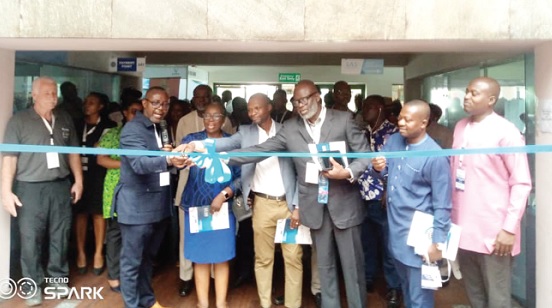
Govt committed to growth of aquaculture — Prof. Nunoo
The Chairman of the Fisheries Commission, Prof. Francis Nunoo has said the government is committed to the growth of the aquaculture industry.
Advertisement
In line with this, he said the ministry had decoupled aquaculture from inland fisheries, and set up a dedicated directorate for it, as well as set up an aquaculture health unit with various monitoring programmes.
He said this at the opening of a two-day aquaculture conference and exhibition in Accra.
The Aquaculture Ghana 2023 Conference and Exhibition, organised by the Chamber of Aquaculture Ghana, discussed sustainability, biosecurity and fish nutrition while providing a platform for stakeholders to network and build resilient partnerships.
Promotion
Prof. Nunoo said the ministry was also promoting the tilapia and catfish culture in Ghana and was also exploring the culture of other species to meet the deficit in Ghana's fish requirements.
“The Aquaculture for Food and Jobs programme is also on course in schools, prisons and other institutions and we are also looking for an efficient technology to go into marine culture.
There have been attempts to go into shrimps in Ghana, which are of high value,” he said.
He said challenges facing the aquaculture sector included the cost of fish feed, which took about 80 per cent, while operators in the sector also battled with fish diseases and lack of financing.
To overcome the fish disease challenge, Prof. Nunoo said the Norwegian government was supporting a capacity-building programme in some universities and veterinaries.
Ghana, he said, was a leader in the aquaculture industry in West Africa and it would take the effective collaboration of stakeholders, including the government, academia, development partners, non-governmental agencies, civil society, farmers, processors and traders, to ensure Ghana retained its leadership position.
He urged fish producers in the value chain to reduce prices, saying “Sometimes, the fish is so expensive.
The dish, Banku and tilapia, is now food for the rich as you have to spend GH¢100 to enjoy it.
As a result, people are taking delight in consuming fingerlings, that is the small fried tilapia, instead of the big mature fish.
We must stop eating the baby fish and eat the bigger ones”.
He urged operators in the aquaculture industry to link up with the Fisheries Commission for technical help and advice and to also collaborate with research institutions to address the challenges facing the industry.
Reducing cost of production
The Chief Executive Officer (CEO) of the Association of Ghana Industries (AGI), Seth Twum-Akwaboah, said the Ghanaian aquaculture industry had grown rapidly over the years and remained attractive.
He said there was an opportunity to increase the growth of the industry as Ghana currently imported more than 50 per cent of its fish requirements to meet local demand and that $290 million worth of seafood and fish products were imported last year into the country.
For the aquaculture sector to grow, he said there would be the need to address the high cost of production driven by the high cost of fish feed and to develop the value chain to make the aquaculture sector competitive.
He said the AGI was committed to supporting the Chamber of Aquaculture to be competitive, to create jobs, and to contribute to the development of the economy.
The Regional Director of the West African chapter of the World Aquaculture Society, Lanre Badmus, stressed that collaboration among the various stakeholders would promote the sustainability of the aquaculture industry as they worked together to address the challenges.
The Chairman of the Chamber of Aquaculture, Dr Henry Anim Somuah, urged the public to patronise fish produced in Ghana rather than imported fish, which was of low nutritional quality compared to the locally produced fish.
Buying fish grown in Ghana, he said, would not only contribute to the growth of the aquaculture industry but would create jobs and contribute to the local economy.
The CEO of the Chamber of Aquaculture, Jacob Adzikah, said aquaculture played a critical role in Ghana’s economy and food security.
Tilapia is the major species farmed in Ghana’s aquaculture sector and constitutes over 80 per cent of aquaculture production, with catfish and other species accounting for the remaining 20 per cent.
Aquaculture in Ghana is promoted to produce fish for human consumption, industrial use and export.




